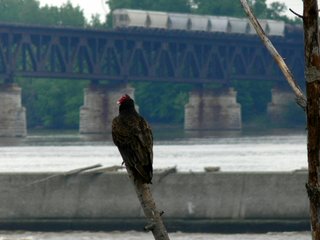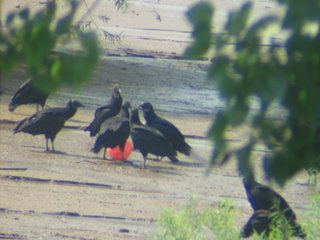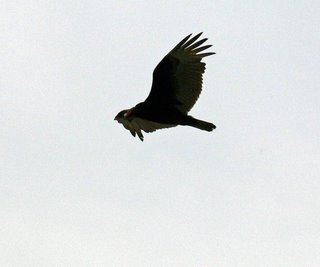 To many people, I am sure the vulture is not a bird to be appreciated. After all, they eat carrion. They are a sign of death and decay. I must differ with this, and say that vultures are truly marvelous birds.
To many people, I am sure the vulture is not a bird to be appreciated. After all, they eat carrion. They are a sign of death and decay. I must differ with this, and say that vultures are truly marvelous birds. Vultures are intelligent birds. At a raptor show, the handler would carry in the owls and hawks. However, she walked in being followed by a young Black Vulture which followed her like a puppy. It had been impressed by people when it hatched and couldn't be released into the wild, but this bird learned new things twice as fast as any other bird they worked with she said. These Black Vultures found a red ball washed up on the river bank, and spent a wonderful morning playing with it. First one would peck at it, then jump back when it moved. Then another would push it back towards the rest. The Vulture Word Cup we called it.
 A Turkey Vulture is most efficient at flying. In the morning, they wait until the sun warms the surrounding area (the rocks at the Falls of the Ohio), and when the thermals start to rise, they all take off at once--a "kettle" of vultures on the wing. A Turkey Vulture only has to tip its wings a bit to change directions and can be easily recognized midair by the "V" position of its wings and the fact that you rarely see it flap. Under the proper conditions, a Turkey Vulture can soar for up to six hours without flapping its wings. The Turkey Vulture Society website has amazing facts about this bird.
A Turkey Vulture is most efficient at flying. In the morning, they wait until the sun warms the surrounding area (the rocks at the Falls of the Ohio), and when the thermals start to rise, they all take off at once--a "kettle" of vultures on the wing. A Turkey Vulture only has to tip its wings a bit to change directions and can be easily recognized midair by the "V" position of its wings and the fact that you rarely see it flap. Under the proper conditions, a Turkey Vulture can soar for up to six hours without flapping its wings. The Turkey Vulture Society website has amazing facts about this bird.
 Although it is constantly exposed to the bacteria associated with decaying meat, the vulture doesn't get sick from it. Its head has few feathers and it will toast itself in the sun to destroy anything it might have picked up. We saw one on the ledge of the 32nd floor in our office building, calming holding its wings outspread to enjoy the sun and breeze from this lofty perch. Its urine is strong enough to kill any bacteria on its legs. The acid in its stomach will destroy many organisms that would kill another animal if ingested. If not for Vultures, we would be up to our elbows in carcasses! Yet for all the road kill along the highway, I've not seen many vultures who got hit by a car from stopping for a little fast food.
Although it is constantly exposed to the bacteria associated with decaying meat, the vulture doesn't get sick from it. Its head has few feathers and it will toast itself in the sun to destroy anything it might have picked up. We saw one on the ledge of the 32nd floor in our office building, calming holding its wings outspread to enjoy the sun and breeze from this lofty perch. Its urine is strong enough to kill any bacteria on its legs. The acid in its stomach will destroy many organisms that would kill another animal if ingested. If not for Vultures, we would be up to our elbows in carcasses! Yet for all the road kill along the highway, I've not seen many vultures who got hit by a car from stopping for a little fast food.
No comments:
Post a Comment